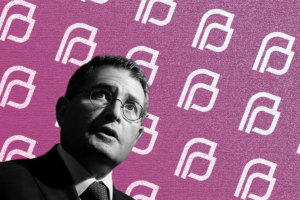SCOTUS Protects Access to Abortion Medication
The decision dismisses the case on standing, preserving the 2016 and 2021 expansions to mifepristone access. An abortion- rights activist holds a box of mifepristone pills as demonstrators from both anti-abortion and abortion-rights groups rally outside the Supreme Court in Washington, Tuesday, March 26, 2024. ( (AP Photo/Amanda Andrade-Rhoades)
An abortion- rights activist holds a box of mifepristone pills as demonstrators from both anti-abortion and abortion-rights groups rally outside the Supreme Court in Washington, Tuesday, March 26, 2024. ( (AP Photo/Amanda Andrade-Rhoades)
Defying expectations, the U.S. Supreme Court unanimously ruled to preserve access to medication abortion in FDA v. Alliance for Hippocratic Medicine, a case that reproductive rights advocates feared would further devastate abortion care across the country. The decision dismisses the case on standing. Advocates say the case should not have been taken up at all and is part of a larger attack against abortion by the broader anti-abortion movement, whose end goal is to manipulate the judicial system and ban abortion nationwide.
“Let’s be clear—today’s decision is not a win by any stretch of the imagination,” said Nourbese Flint, the president of the reproductive rights organization All* Above All. “This case had no business making it to the highest court of the land and should’ve been struck down to begin with. Any attempt to restrict medication abortion care falls hardest on those already marginalized by our health care system, who need the privacy and convenience that medication abortion offers—and that’s exactly what anti-abortion politicians and judges are after.”
Mifepristone is a safe, effective, FDA-approved medication that is now used in more than half of all abortions. The medication has been used for more than 20 years in the U.S., and its safety is documented in more than 100 peer-reviewed articles. Telehealth provision of medication abortion is just as safe and effective as in-person care. Polling shows that people of color support measures promoting access to abortion care and plan to vote with abortion in mind.
“This case had no business making it to the highest court of the land and should’ve been struck down to begin with.”
“While they were unsuccessful today, this case was born out of a plan by anti-abortion, anti-democratic forces to weaponize the courts and to seize power from the people by any means necessary,” Flint said. “Two years since this same court struck down Roe v. Wade, we are no longer settling for crumbs as a pathway to liberation. For true abortion justice, we need care in ways that work best for us, with dignity and compassion, not political interference and more barriers.”
Jamila Perritt, the president and CEO of Physicians for Reproductive Health and an OB-GYN in Washington, D.C., rallied outside the Supreme Court building during oral arguments, where she made clear that medication abortion is safe, effective, and essential for communities of color. Statistics reveal that about 63% of all abortions last year were medication abortions, making any limitations on mifepristone access a significant barrier to timely and safe abortion care. Perritt emphasized mifepristone’s ease of use and its critical role in ensuring reproductive health care accessibility.
“Today’s ruling is in alignment with medical evidence and with what our communities need and deserve in order to live full, healthy lives,” Perritt said. “Regardless of what happens in the court, abortion care, and medication abortion care specifically, will always be a part of that … Today’s decision reflects and acknowledges the dire short- and long-term consequences abortion restrictions impose and demonstrates a valuing of science, medical expertise, and centering the needs of our communities. The court’s dismissal on standing allows us to center the medical recognition of the facts [and] is a powerful affirmation of what we have always known: mifepristone is a safe and essential medication, and there is no legitimate medical or scientific reason why access to mifepristone should be limited.”
The case was filed by the Alliance for Hippocratic Medicine in the U.S. District Court for the Northern District of Texas. It argued that the FDA did not properly approve the use of the drug mifepristone for pregnancy termination under the federal Food, Drug, and Cosmetic Act. The proposed changes in the case primarily focused on prescribing rules for mifepristone, including mandates for in-person dispensation and alterations to gestational age limits.
“Reproductive health care services are also going to be disproportionately impacted when we restrict abortion care,” Perritt said. “People with money, with means, with resources, have always and will always have abortions, but folks who have been historically and are presently excluded from many of the opportunities and resources that so many other folks have, so many other communities have, are again going to feel the brunt and the burden of these restrictions.”
Perritt highlighted that these restrictions could impede individuals’ ability to access necessary care, particularly affecting vulnerable populations such as young people, rural communities, and individuals with low incomes.
“We are talking about restricting access to a medication that is very safe, that is very effective, in the midst of a maternal mortality crisis,” Perritt said. “And we know that forced pregnancy worsens outcomes for both the pregnant person and the child that they deliver. And so all of these things are really happening at the same time. So physicians, the doctors in our network, and as a practicing physician myself, we’re terrified about what this means and also really deeply hopeful that medicine and science will eventually win out.”
“Mifepristone is a safe and essential medication, and there is no legitimate medical or scientific reason why access to mifepristone should be limited.”
Mifepristone is also used in miscarriage management. Now that the Supreme Court has decided to preserve access to the medication, people experiencing an early miscarriage will still be able to obtain the medication via mail or at a commercial pharmacy up to 10 weeks into pregnancy, allowing miscarriage management options in all states across the country. Physicians in many states can also legally prescribe mifepristone up to 12 weeks into pregnancy, a time frame recommended by the World Health Organization and supported by scientific evidence.
Perritt outlined pathways for continued support of abortion access, emphasizing the importance of legal safety amid growing concerns of criminalization for seeking abortion care. She underscored the necessity for collective action and vigilance, emphasizing that no state is immune to the broader implications of restrictive rulings.
“Today, we pause and celebrate this decision alongside our movement partners,” said Shelby Chestnut, the executive director of Transgender Law Center. “Whether we’re fighting for safe and affirming care or our rights to make our own decisions about our bodies, we must remember that our power lies in our collective response to oppressed people everywhere. Let us take this moment to acknowledge the hard work and commitment of advocates and continue to show up for all people who seek abortion care.”
Despite the challenges ahead, Perritt remains cautiously optimistic, looking back at the decades of organizing and advocacy that have paved the way for defending reproductive rights. She emphasized the importance of upholding medical integrity and resisting politicization of health care decisions.
“Today, we celebrate this meaningful victory thanks to our community’s relentless advocacy,” said Perritt. “While we celebrate today, we know there is much work to be done. We will continue fighting for comprehensive reproductive health care, listening to our community, and advocating for policies grounded in science, humanity, and the best medical practices. We will not rest until everyone has unfettered access to the care they deserve, free from political interference.”
Your support is crucial…With an uncertain future and a new administration casting doubt on press freedoms, the danger is clear: The truth is at risk.
Now is the time to give. Your tax-deductible support allows us to dig deeper, delivering fearless investigative reporting and analysis that exposes what’s really happening — without compromise.
Stand with our courageous journalists. Donate today to protect a free press, uphold democracy and unearth untold stories.









You need to be a supporter to comment.
There are currently no responses to this article.
Be the first to respond.